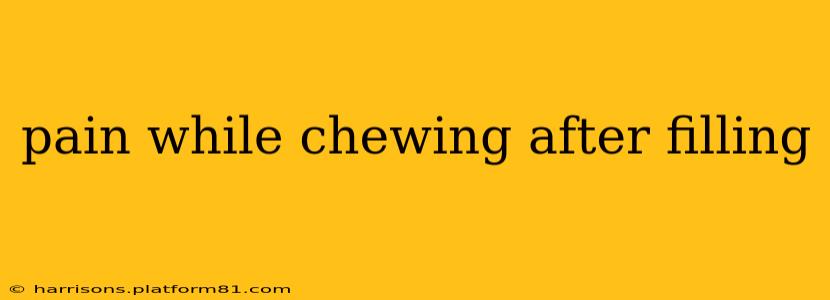Experiencing pain while chewing after getting a filling is a common concern, but it shouldn't be ignored. This discomfort can range from mild sensitivity to sharp, throbbing pain, significantly impacting your ability to eat and enjoy your meals. Understanding the possible causes and available treatments is crucial for managing this issue and ensuring the long-term health of your teeth.
This comprehensive guide explores the various reasons why you might feel pain after a filling, offering insights into potential solutions and preventative measures. We'll also address frequently asked questions surrounding this topic.
Why Does My Tooth Hurt After a Filling?
Several factors can contribute to pain after a dental filling. The most common culprits include:
- High Filling: If the filling material is placed too high, it can interfere with your bite, putting pressure on the tooth and causing pain when chewing.
- Irritation of the Pulp (Nerve): Even with careful placement, the filling procedure can sometimes irritate the pulp, leading to sensitivity and pain. This is often temporary.
- Infection: In some cases, an infection can develop beneath the filling, causing persistent pain and discomfort. This is less common but requires immediate professional attention.
- Cracked Tooth: A pre-existing crack in the tooth might have been exacerbated during the filling procedure, leading to pain upon chewing.
- Sensitivity to the Filling Material: Some individuals may experience allergic reactions or sensitivities to certain filling materials, causing discomfort.
- Incomplete Removal of Decay: If decay wasn't completely removed before the filling was placed, this can lead to ongoing pain and potential re-infection.
What Should I Do If My Tooth Hurts After Getting a Filling?
If you're experiencing pain after a filling, it's vital to contact your dentist immediately. They can assess the situation and determine the underlying cause. Delaying treatment could worsen the problem.
How Long Does Pain After a Filling Last?
The duration of pain varies. Mild sensitivity that resolves within a few days is generally considered normal. However, persistent or severe pain warrants a dental visit. In most cases, temporary pain should subside within a week or two. Longer-lasting pain suggests a more serious underlying issue.
Can a Filling Cause Lingering Tooth Pain?
While most instances of post-filling pain are temporary, lingering tooth pain can indicate an unresolved problem. This could be due to the reasons mentioned earlier, including an infection or a cracked tooth. Persistent pain demands prompt professional evaluation.
What are the Treatments for Post-Filling Tooth Pain?
Treatment depends on the cause of the pain. Your dentist may:
- Adjust the Filling: If the filling is too high, they'll adjust it to restore proper bite alignment.
- Prescribe Medication: Pain relievers or antibiotics may be prescribed to manage pain and address any infections.
- Root Canal: In cases of severe pulp irritation or infection, a root canal may be necessary to save the tooth.
- Extraction: If the tooth is severely damaged or the infection is untreatable, extraction might be the last resort.
How Can I Prevent Pain After a Filling?
Several proactive measures can help minimize the risk of post-filling pain:
- Choose a Reputable Dentist: Selecting a skilled and experienced dentist is crucial for minimizing complications.
- Communicate Clearly: Inform your dentist about any pre-existing pain or sensitivity before the procedure.
- Follow Post-Procedure Instructions: Carefully follow your dentist's instructions regarding aftercare, such as avoiding certain foods or using ice packs.
- Maintain Good Oral Hygiene: Regular brushing, flossing, and dental checkups contribute to overall oral health and help prevent future issues.
Pain after a filling is a common occurrence, but it's vital to seek professional help if the pain is persistent or severe. Early intervention can prevent more significant problems and help preserve the health of your teeth. Remember to communicate openly with your dentist, and they will be able to offer the best course of action for your individual situation.
